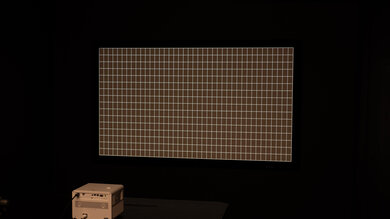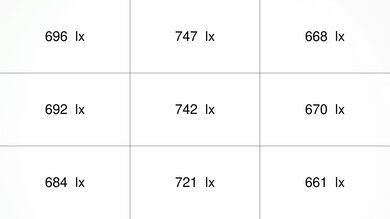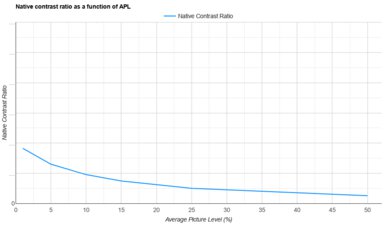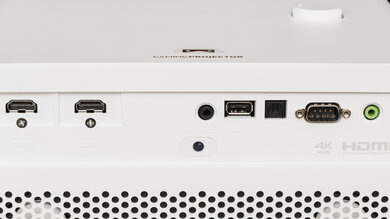
If you're searching for a home projector, image quality and features take precedence over portability. Sure, the ability to carry your projector from room to room is nice, but ultimately, you'll always have access to an outlet. You'll also have greater control over room conditions, like lighting, than if you were to take the projector outside. Thus, before shopping, consider the room, or rooms, where you hope to set up the projector. If the room has a few lights or windows, having a projector with higher peak brightness is more important than deep contrast. The inverse is true if you install the projector in a darker room. Also, consider the projector's primary usage. Will it primarily be used for watching movies from physical media, or do you prefer streaming services? Or perhaps you're buying a projector to play games with your friends? All of these will guide you toward the best product for your needs.
We've bought and tested over 40 projectors, and below, we list the best overall projectors for home use, covering a few critical use cases from home theater to gaming. We only cover consumer models, not high-end products meant for enthusiasts. If you're specifically looking for a home theater projector, explore our recommendations for the best models for home theater use. If you'd rather want a list of the best budget and cheap projectors on the market, look up the best cheap projectors. Want to take your projector outdoors? Consider our picks for the best outdoor projectors. And don't forget—you can even vote on which projectors you'd like us to purchase and put to the test!
-
Best Home Projector
MoviesBrightness8.2Contrast7.7Light SourceLEDResolutionPixel Shift 4kSmart OSAndroidIf you're in the market for the best home projector, consider the BenQ X3100i. This projector stands out for its adaptability, offering advanced home theater capabilities and HDR10+ support. It's easily bright enough for moderately lit rooms, and its good contrast and wide color range ensure a pleasant viewing experience in dark rooms. Thanks to pixel-shifting technology, it delivers an image that stays sharp even when projected onto large surfaces. Ultimately, the projector excels in most contexts, regardless of lighting conditions. It's also highly accurate right out of the box, so even those who are particular about color accuracy will be largely pleased with this unit's performance without needing to calibrate it.
But it's not just about display capabilities—it's also a standout for streaming content. The included QS02 dongle supports Google Cast and Apple AirPlay, and it offers Wi-Fi 6 and Bluetooth 5.0 support. It's a great choice for gamers, with two HDMI 2.0b ports that can handle 4k @ 60Hz, 1440p @ 120Hz, and 1080p @ 240Hz signals. The third HDMI port, concealed behind the top cover, is intended for use with the included dongle but can also accommodate any HDMI device. The projector also comes with two integrated 5W chambered speakers; they'll do in a pinch, but you'll get the best sound with a soundbar or receiver connected to the unit's eARC port. This is the most adaptable projector we've tested and is the best option for anyone except perhaps ardent home theater fans.
-
Best Home Theater Home Projector
MoviesBrightness8.7Contrast8.0Light SourceLampResolutionPixel Shift 4kSmart OSNoIf you're seeking the ultimate home projector for watching movies, the Epson Home Cinema 3800 is a slightly better pick than the BenQ X3100i due to its edge in brightness and contrast. It's certainly bright enough to look great in moderately lit rooms. However, it excels in darker settings due to its great contrast ratio, so install it in a dark basement for maximum impact. Straight out of the box, this model delivers remarkable color accuracy, so there's no need to calibrate it to get an accurate picture. Its one weakness is its decent but unexceptional color gamut; it's wide enough for SDR content, but HDR content doesn't look as punchy as possible. If that bothers you, consider an upgrade to the even more expensive Epson Home Cinema 5050UB, although it's not worth it for most users.
The Epson falters somewhat in its features; it's rather minimalistic. It lacks Wi-Fi or a built-in smart OS but offers Bluetooth. If smart features are important, consider investing in an external streaming dongle or buying the BenQ. The unit's two HDMI 2.0 ports allow for seamless connection to external devices, with both ports capable of handling a 4K @ 60Hz signal, and the 12V trigger out port enables automated projector screen deployment. Unfortunately, this projector doesn't support eARC. While it has integrated speakers, you'll have a much better audio experience with a receiver or using the unit's audio out port for sound. Overall, the Epson is the go-to choice for enthusiasts looking to recreate a cinema experience in their basement.
-
Best Short-Throw Home Projector
MoviesBrightness8.7Contrast7.2Light SourceLaserResolutionPixel Shift 4kSmart OSAndroidIf you want to install your projector very close to the wall or screen, the ultra-short-throw Epson EpiqVision Ultra LS800 is an excellent choice. Its image quality isn't as good as the BenQ X3100i or the Epson Home Cinema 3800, but it can project an 80-inch image while sitting just 0.9 inches away from the wall. For a larger display, it can project up to 150 inches from a distance of 9.9 inches, which is still very close. Beyond its impressively small projection distance, the LS800 is also one of the brightest projectors we've tested, eliminating the need to dim the lights. It also performs well in dark rooms, thanks to its satisfactory contrast. The projector's color range and accuracy are solid, too, offering excellent SDR and HDR image quality overall.
The LS800 is feature-rich, with built-in Android TV and full Chromecast integration. It has a variety of ports, including two USB 2.0 data ports, a 3.5mm audio jack, an optical out connection, and a 2.0A DC Out USB port. It also boasts three HDMI ports, one with ARC capability. All HDMI ports support 4K @ 60Hz signals, and the third can handle 1080p @ 120Hz, perfect for gamers. Additionally, the projector supports Bluetooth 5.0 and Wi-Fi 5. Overall, the EpiqVision Ultra LS800 is the best short-throw projector we've tested, and its versatility makes it one of the best projectors for bedroom use, though it comes at a high price.
-
Best Streaming Home Projector
MoviesBrightness8.4Contrast6.4Light SourceLED + LaserResolutionPixel Shift 4kSmart OSAndroidIf you're searching for the perfect streaming projector, consider the XGIMI HORIZON Ultra. This model is packed with smart features and has Wi-Fi 6 and Bluetooth 5.2 support. It also delivers excellent image quality, with impressive brightness that can counteract a few lights, which is good as the projector's contrast is mediocre; it doesn't look as good in a pitch-black room as the BenQ X3100i, Epson Home Cinema 3800, or even the Epson EpiqVision Ultra LS800. Still, it's well-calibrated right out of the box and projects vibrant images with its wide color gamut, delivering a pleasant overall image. Plus, it supports HDR, making it a fully-featured projector for home use.
This projector offers good image quality and is relatively lightweight at 11.2 pounds, making it easy to move around your home as needed. Its Android TV 11 OS includes Chromecast and AirScreen for effortless casting from your phone, and it comes with two 12W Harman/Kardon speakers if you prefer not to connect the unit to a soundbar through its eARC port. However, it's recommended for the best sound quality possible. Ultimately, the XGIMI has far more features than the barebones Epson Home Cinema 3800 and is sold for much less than the BenQ X3100i or Epson EpiqVision Ultra LS800, so it's the best option if you want an easy-to-set-up projector to watch movies from streaming services.
-
Best Budget Dark Room Home Projector
MoviesBrightness7.0Contrast7.6Light SourceLampResolutionPixel Shift 4kSmart OSNoIf you're primarily looking for a dark room projector but find the BenQ X3100i and Epson Home Cinema 3800 too expensive for your tastes, consider the ViewSonic PX701-4K. Its pixel-shifting technology enables it to project a higher-resolution image than the Epson Home Cinema 1080, and it boasts decent brightness, too; nothing extraordinary, but bright enough for rooms with dim lighting. Plus, its contrast is good, positioning it as a solid budget-friendly home cinema choice and one of the best projectors for bedrooms. This model features two HDMI ports that can handle 4k @ 60Hz or 1080p @ 240Hz signals, a fantastic gaming feature at this price point. Sadly, its color accuracy is quite poor straight out of the box, and calibration can only slightly improve it; it's really not the right product for anyone who cares about color accuracy.
While it supports HDR10/HLG, its color gamut and output brightness aren't sufficient to deliver a pleasing HDR experience, so look at the other picks above if that matters to you. It also lacks any smart OS or wireless features, so you'll need to connect an external streaming dongle if you want streaming capabilities. It also has an integrated 10W speaker, but connecting a speaker to its audio out port is preferable for the best sound quality. If you're looking for a budget projector for a dark room or want to pair it with a video game console, the ViewSonic PX701-4K is a tremendous value at its price point, even considering its poor color accuracy.
-
Best Value Home Projector
MoviesIf you're searching for a home projector that offers the best bang for your buck, consider the Epson Home Cinema 1080. It projects a clear 1080p image and appears bright and relatively vibrant in dark rooms due to its excellent brightness. However, its contrast leaves something to be desired; if you're specifically shopping for a dark room projector, consider instead the ViewSonic PX701-4K. The Home Cinema 1080's colors are alright, and this model is sufficient at projecting pleasing shades but doesn't quite match the performance of the top-tier models. It still covers most of the Rec. 709 color space used in SDR content but doesn't support HDR. More impressive is the projector's color accuracy; it's great overall, enough for almost anyone. However, it has very limited calibration options, so color purists who strive for perfection won't be able to fine-tune its colors.
A nice surprise for an otherwise cheaper model: the Home Cinema 1080 boasts more features than the significantly pricier Epson Home Cinema 3800. Although it still doesn't come with a smart OS, it does have Wi-Fi 5 built-in, with Miracast support for screen mirroring; it's easier to mirror your phone with this model than with the more expensive one. It has two 1080p @ 60Hz HDMI ports, though it lacks ARC/eARC capability. It only comes with a weak integrated 2W speaker, but luckily, it has an audio out port, allowing you to use it for audio if you're not ready to invest in a receiver. You can also use its USB-B port to connect it to an external audio interface. Overall, it's the best value home projector on the market and is more than adequate for most people, except perhaps enthusiasts.
Notable Mentions
- Epson EpiqVision Flex CO-W01: The Epson EpiqVision Flex CO-W01 is an alright performer, but its price is outstanding. It's a good option for anyone looking for a bright projector at the cheapest price possible. Unfortunately, it projects images in a 16:10 aspect ratio, which isn't optimal for watching movies, and its contrast isn't nearly good enough for dark rooms. For most people, the Epson Home Cinema 1080 or ViewSonic PX701-4K offer more for just a bit more money. See our review
- Epson EpiqVision Ultra LS300: The Epson EpiqVision Ultra LS300 is a good alternative to the XGIMI HORIZON Ultra. It's more accurate than the XGIMI and is easier to place in a room due to its ultra-short throw capability, although the XGIMI is smaller and lighter, so it's easier to move around. However, the XGIMI is a 4k pixel shift projector, so it projects a sharper image than the 1080p LS300, and the XGIMI is more colorful overall. It's close, but the XGIMI also tends to be sold cheaper, giving it the edge. See our review
- Epson Home Cinema 5050UB: Although the Epson Home Cinema 5050UB is the top home theater projector we've evaluated, it provides only a marginal enhancement over the considerably less expensive Epson Home Cinema 3800. Plus, its limited feature set can't match the versatility of the cheaper BenQ X3100i. See our review
- Formovie THEATER: The Formovie THEATER's contrast is outstanding, positioning it as a leading choice if you're in the market for a home theater projector or are looking for the best projector for bedroom use. It performs exceptionally well in completely dark rooms. However, the Epson Home Cinema 3800 also offers remarkable contrast, surpassing the Formovie in brightness and accuracy. The Formovie also doesn't quite match the BenQ X3100i in terms of versatility, as the BenQ has more features while offering slightly better image quality. See our review
- Hisense C1: The Hisense C1 is one of the leading consumer-oriented home cinema projectors, rivaling the Epson Home Cinema 3800 and BenQ X3100i. However, both competitors deliver superior image quality and color accuracy compared to the Hisense model. Plus, while the Hisense boasts more features than the Epson, it doesn't match the extensive feature set of the BenQ. See our review
Recent Updates
-
Aug 08, 2024: The Epson EpiqVision Ultra LS800 is now the 'Best Short-Throw Home Projector' pick, an excellent option if you need to place your projector close to the wall. Otherwise, we've updated our picks to increase clarity.
-
Jul 10, 2024: Modified the ViewSonic PX701-4K's pick to emphasize the projector's dark room capabilities; it's now the 'Best Budget Dark Room Home Projector.'
All Reviews
Our recommendations above are what we think are currently the top home projectors for most people to buy. We factor in the price (a cheaper projector wins over a pricier one if the difference isn't worth it), feedback from our visitors, and availability (no models that are difficult to find or almost out of stock everywhere).
If you'd like to do the work of choosing yourself, here's the list of all our projectors. Be careful not to get too caught up in the details. While no projector is perfect, many are good enough for most uses; however, avoid the worst models to ensure adequate quality.





























